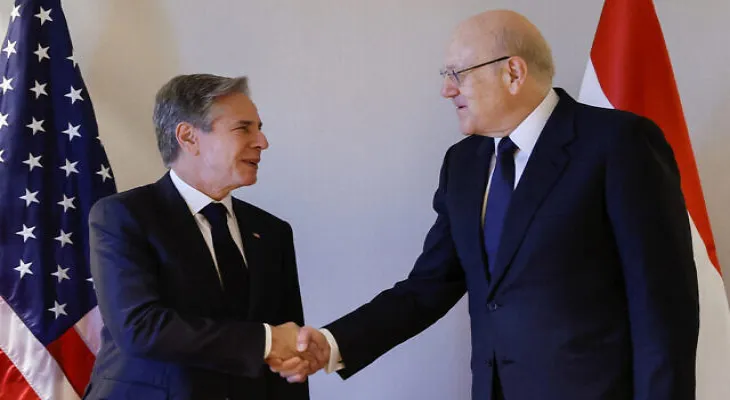Search here
Newspaper
Search here

Arab Canada News
News

Published: November 4, 2023
U.S. Secretary of State Antony Blinken intensified his hectic diplomacy today, Saturday, in an attempt to rally support for planning the post-war future in Gaza as he continues his second urgent mission to the Middle East since the deadly Hamas attack on October 7 led to war with Israel.
The senior U.S. envoy in Amman met with senior Jordanian and other Arab officials, who remain angry and deeply skeptical of Israel as it intensifies its war against Hamas.
Blinken first met with Lebanese caretaker Prime Minister Najib Mikati, whose economically and politically torn country is home to the Iran-backed Hezbollah group.
State Department spokesman Matthew Miller said Blinken thanked Mikati for his leadership “in preventing Lebanon from being dragged into a war that the Lebanese people do not want.”
Miller said Blinken also discussed U.S. efforts to secure humanitarian aid for civilians in Gaza.
The United States has serious concerns that Hezbollah, which has already stepped up its rocket attacks and cross-border assaults on northern Israel, could play a more active role in the war. The U.S. has sent two groups of aircraft carriers to the eastern Mediterranean in an attempt to deter the movement from opening a second front against Israel.
On Friday, Hezbollah Secretary-General Hassan Nasrallah gave his first major speech since the Hamas attacks on Israel on October 7, which ignited the war, but he did not anticipate greater involvement from his group despite declaring that it was not disturbed by U.S. attempts to deter it.
Neither Blinken nor Mikati spoke to reporters at the start of their meeting at a hotel in Amman.
Blinken also did not speak publicly while posing for photos with the Qatari foreign minister, whose country has emerged as the most influential interlocutor with Hamas and was instrumental in negotiating the limited release of hostages held by the movement as well as convincing it to allow foreign nationals to leave Gaza and cross into Egypt.
Qatar is home to a number of Hamas leaders, and the Gulf state has pumped tens of millions of dollars into Gaza in recent years.
Blinken is scheduled to next meet with the head of UNRWA, the United Nations agency responsible for aiding Palestinian refugees.
Later, Blinken is scheduled to conduct group talks with the foreign ministers of Qatar, Jordan, Egypt, Saudi Arabia, and the United Arab Emirates, and the head of the Palestine Liberation Organization's executive committee.
All these parties have condemned the Israeli tactics against Hamas, which they view as illegal collective punishment of the Palestinian people.
Israel says its attack aims to destroy Hamas’ infrastructure, vowing to eliminate the entire movement that governs the sector. It says it targets all areas where Hamas operates while seeking to minimize civilian casualties.
Blinken will also meet with Jordan’s King Abdullah II, whose country summoned its ambassador to Israel this week and asked the Israeli envoy not to return until the war ends.
However, Arab states have so far resisted U.S. proposals to play a bigger role in the crisis, expressing anger over civilian losses resulting from Israeli military operations but believing that Gaza is largely an Israeli-made problem.
The meeting of Arab officials with Blinken was convened at the invitation of Jordanian Foreign Minister Ayman Safadi, who said the meeting was organized “in the context of their efforts to stop the Israeli war on Gaza and the humanitarian disaster it is causing,” according to the Jordanian Foreign Ministry.
The meetings came a day after Prime Minister Benjamin Netanyahu rejected Blinken’s call for a humanitarian ceasefire in the fighting in Gaza, saying it would need to include the release of hostages held in the sector.
However, U.S. officials believe that Arab support — however modest — will be crucial to efforts not only to alleviate the deteriorating situation in Gaza but also to lay the foundation for what will replace Hamas as the ruling authority in the area if and when Israel succeeds in eliminating Hamas.
Nevertheless, ideas about future governance in Gaza are few and far between, with Blinken and other U.S. officials offering a vague plan that could include a mix of a revitalized Palestinian Authority — which has not been a factor in the sector since Hamas took over the area in 2016 — international organizations, and possibly a peacekeeping force.
U.S. officials acknowledge that these ideas have been met with a clear lack of enthusiasm in Hamas.
Israel launched its war against Hamas on October 7, after the group carried out a bloody attack in southern Israel, killing about 1,400 people and taking more than 240 hostages.
According to The Times of Israel, the vast majority of those killed that day were civilians, and Israel has vowed to eliminate the group and destroy its infrastructure. Since then, it has struck thousands of Hamas targets within the sector with airstrikes and an ongoing ground operation.
The Hamas-run health ministry in Gaza has accused Israel of killing more than 9,000 people, while hundreds of thousands of Gaza Strip residents have moved from the north of the sector to the south as Israel warned of its intensive assault on Gaza City. The United Nations and international actors have warned of a potential humanitarian disaster and called on Israel to significantly increase the allowed aid to the sector through the Egyptian Rafah crossing.
Comments